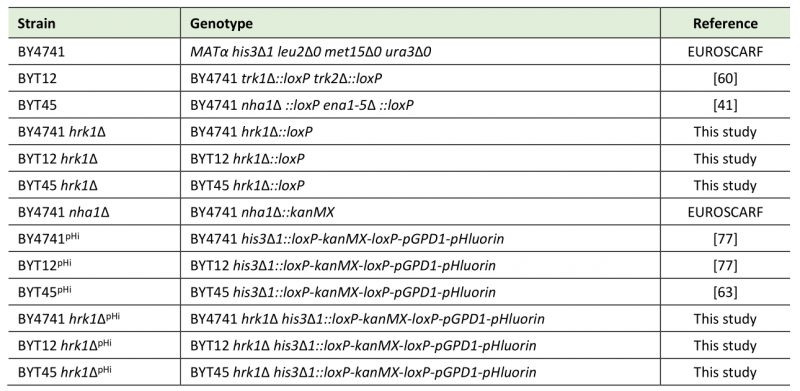Back to article: The Hrk1 kinase is a determinant of acetic acid tolerance in yeast by modulating H+ and K+ homeostasis
Table 1. Saccharomyces cerevisiae strains used in this study.
41. Navarrete C, Petrezsélyové S, Barreto L, Martínez JL, Zahrádka J, Ariño J, Sychrová H, Ramos J (2010). Lack of main K+ uptake systems in Saccharomyces cerevisiae cells affects yeast performance in both potassium-sufficient and potassium-limiting conditions. FEMS Yeast Res 10(5): 508–517. 10.1111/j.1567-1364.2010.00630.x
60. Petrezselyova S, Zahradka J, Sychrová H (2010). Saccharomyces cerevisiae BY4741 and W303-1a laboratory strains differ in salt tolerance. Fungal Biol 114(2-3): 144–150. 10.1016/j.funbio.2009.11.002
63. Zimmermannová O, Felcmanová K, Rosas-Santiago P, Papousková K, Pantoja O, Sychrová H (2019). Erv14 cargo receptor participates in regulation of plasma-membrane potential, intracellular pH and potassium homeostasis via its interaction with K+-specific transporters Trk1 and Tok1. Biochim Biophys Acta 1866(9): 1376–1388. 10.1016/j.bbamcr.2019.05.005
77. Zimmermannova O, Salazar A, Sychrová H, Ramos J (2015). Zygosaccharomyces rouxii Trk1 is an efficient potassium transporter providing yeast cells with high lithium tolerance. FEMS Yeast Res 15(4): fov029. 10.1093/femsyr/fov029

